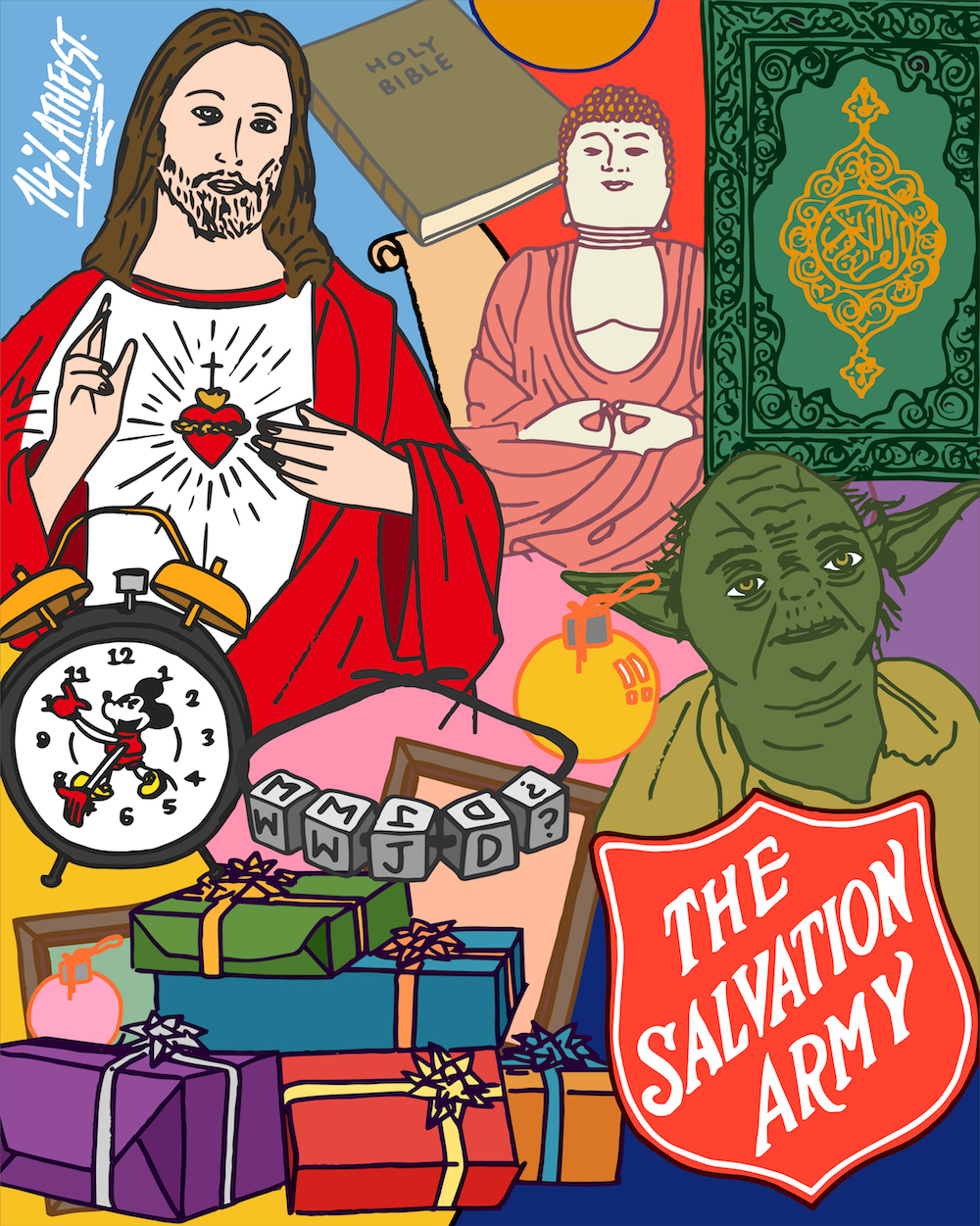 “If I could work my will… every idiot who goes about with ‘Merry Christmas’ on his lips should be boiled with his own pudding, and buried with a stake of holly through his heart.”
“If I could work my will… every idiot who goes about with ‘Merry Christmas’ on his lips should be boiled with his own pudding, and buried with a stake of holly through his heart.”
—Ebenezer Scrooge
Scholars today claim that they know many true details about Jesus, not least that he was born in June rather than on 25 December. They are, of course, making claims about the “historical Jesus”. Their accounts contrast with those of the “dogmatic Christ” and the “Christ of Faith”. In fact, historians and scholars who study or have studied Christ’s life concur on only two events: a crucifixion by Romans and a baptism, probably a kind of Jewish mitzvah. He was, after all, Jewish, and so was John, the ascetic who baptized him.
Whether the accounts of messiahs and sages like Jesus are true or not, the writer Joseph Campbell noted a commonality of miraculous life-and-death stories. The Buddha was born from his mother’s side in a pond, as one story goes. Jesus was born to a virgin mother. At death, the Prophet rose from a stone into Heaven. Deities are intended to be super-human, not like us mortals. (George Lucas has credited the ideas of Campbell as the source, in part, of the first Star Wars film. Further, Campbell’s 1988 TV documentary was filmed at Lucas’s Skywalker Ranch in California.)
So how does all this relate to Christmas? It doesn’t. Maybe it should. I certainly didn’t think about or know any of it when I was six years old and slept on a rug beside the annual Christmas tree which reached the ceiling of our dining room. I was permitted to unwrap only one gift on Christmas Eve that year: a mechanical Mickey Mouse alarm clock. I set it to wake me early so that I could reach over and tear into the boxes.
I already knew what most of my gifts were because they were stored months ahead in the living-room closet. Did my mother and aunt not think that I would find them? I knew where everything was, not just Christmas gifts, in and under our house. Loneliness creates idle hands. One time I found condoms but wasn’t quite sure what they were. I asked a friend and still didn’t quite understand.
Some presents were complicated mechanical toys. Because I needed to know how they functioned, I would disassemble them. But, whoops! I couldn’t put some back together again, much like that famous egg, Humpty Dumpty.
A common motto is “What would Jesus do?” Likewise, what would Jesus think of Santa Claus, his elves, Christmas trees, gifts, gaudy decorations strung across streets and alleys, and advertisers pestering the living daylights out of us? Would he be amused about some rituals and miffed by others? Would it all be of no consequence to him?
The stories about Jesus are numerous, but be careful. Satirizing Him is taboo, even though many have. Instead, we mostly badger the fictional Santa, particularly in Hollywood films and on TV. In department stores, he frightens toddlers who in turn pee on him. Those who impersonate him, as if he were a person, might be drunkards, pillars of the community or your dad.
People need heroes, saviours, legendary figures and holy men and women. They transcend imperfect normal humans, who are riddled with superstitions. My grandfather never went to church, as I recall, yet thought that I, his only grandchild, was a gift from God. He claimed to be religious and was so superstitious that he would throw salt over his shoulder after spilling the shaker. He had a number of similar rituals.
According to one opinion poll, and there are many, atheists compose only 14% of the world’s population. A Pew survey found that American agnostics, atheists, secularists and non-religious citizens represent a bit over 7%. But this number is not to be trusted, as can be said of the findings of many public surveys, because most Americans will not confess to being atheists. It isn’t kosher. Nevertheless, it’s inevitable that non-believers will celebrate Christmas in one way or another, even if they only attend the annual office party, get drunk and do something naughty in the toilet.
People love celebrations. They break up a boring life. Most festivals have lost the original specifics in the public memory for their creation. Colbert, Louis XIV’s moneyman, suppressed seventeen holidays in the seventeenth century. Despising idleness, he assumed that holidays or time off from work drained the economy, a concept held by benighted managers of many companies today.
When the zillions of religious and so-called secular Christmas songs are beginning to be played what seems like everywhere a month before the actual day arrives, everyone is forced to listen. What about so-called Christmas songs that are wholly (not holy) secular, unrelated to Jesus and more about the Northern Hemisphere’s winter weather, like this one:
The weather outside is frightful.
But the fire is so delightful.
And since we’ve no place to go,
Let it snow! Let it snow! Let it snow!
Is it played over the airwaves in the South Pacific? I remember it being broadcast on an automobile radio during Christmastime a very long time ago in the US South, where there was likewise no snow. I was about seven years old and was sitting in the front seat between my mother, who was then single, and her date, a soldier. He was drunk and asked her to marry him. She said: “I think we should discuss this at another time.”





